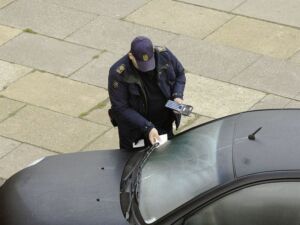News
Danes getting more and more fines
This article is more than 10 years old.
Generated revenue increasingly higher each year

Are the increasing number of fines for our own good, or just another way of pinching our money? (photo: Heb)
There are speeding fines, library fines, fireworks fines and penalties for the possession of illegal drugs and not having the correct lights on your bicycle.
It’s the list that never ends, and this year, the state finance sector budgeted a total fine revenue of over 2 billion kroner – far more than ever before.
Five years ago, in 2010, the fines only accounted for approximately 900 million kroner in revenue.
Last year, they came in at around 1.6 billion kroner, but since then the police have introduced an automated speed control system that has led to a dramatic upsurge in the number of fines handed out each year.
More and more reasons to receive a fine
According to Professor Jacob Torfing from Roskilde University, there are several reasons for the increase in the number of fines distributed across Denmark.
“There is a significant increase in the number of automated speed cameras, and the police have really started to crack down on speeding in general. It all leads to more fines and punishments.”
At the same time, Danes can now be fined for a number of new reasons, including failing to appear for treatment at hospital or the dentist, or doing a no-show for a vehicle inspection.
Fines causing distrust
However, according to experts, the increased focus on financial penalties may ultimately run the risk of promoting a distrust of the authorities.
“From the outside, it may be difficult for the public to see whether politicians intend on changing people’s behaviour with these fines, or simply pinching money from the public,” Bo Sandmann Rasmussen, a professor of economics at Aarhus University, told Berlingske.










































